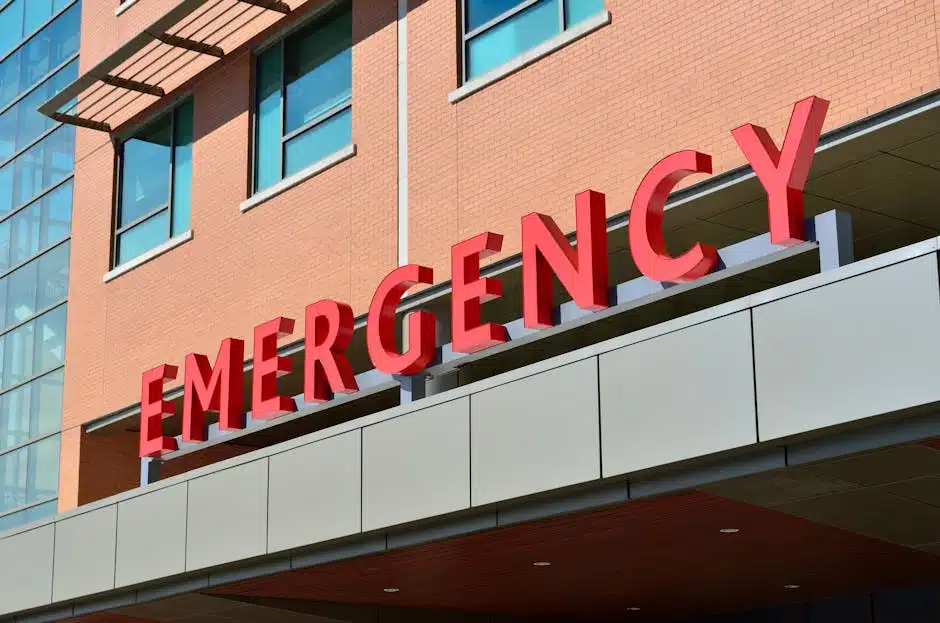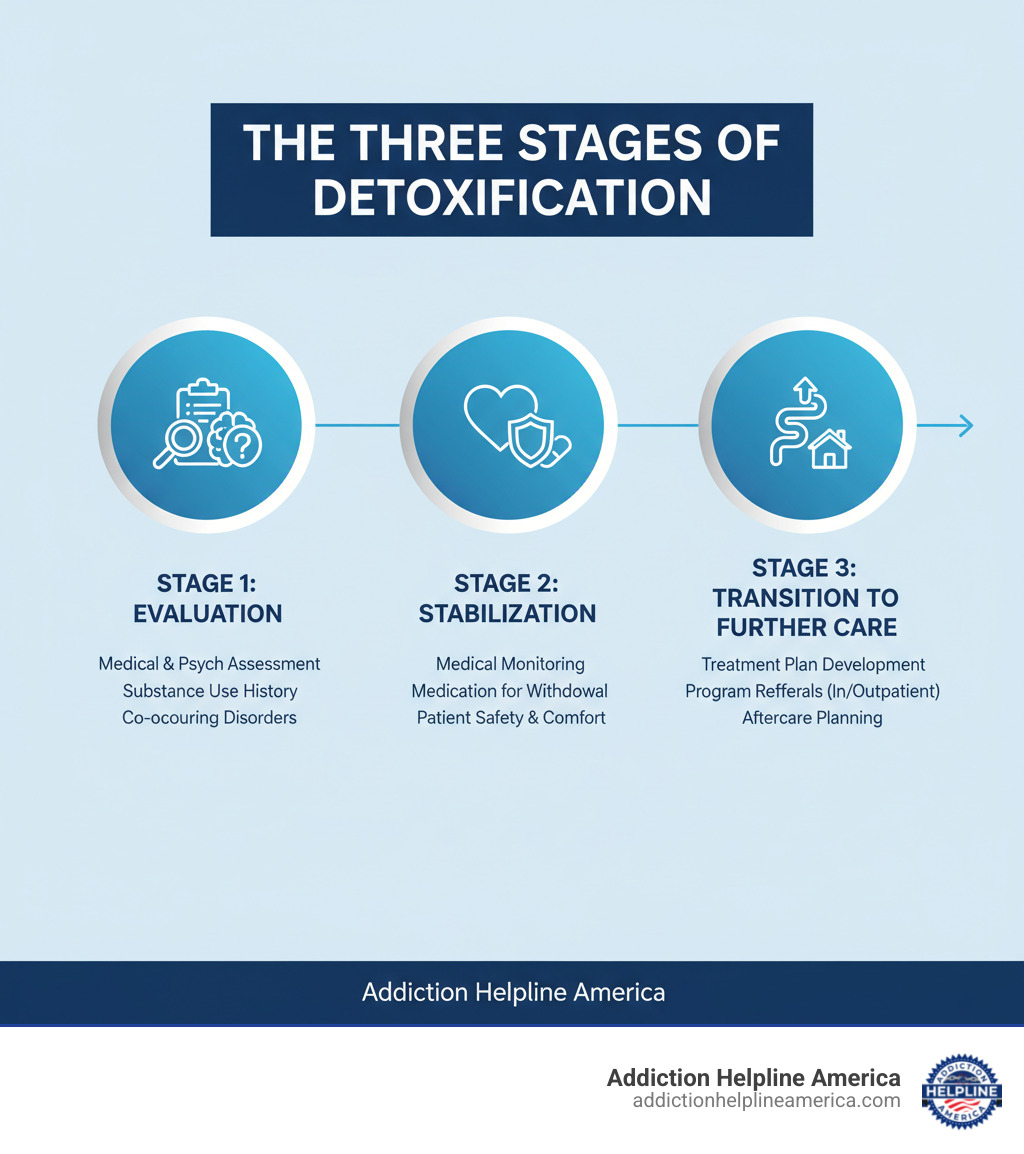
Understanding Your Options for Safe, Medically Supervised Detox
Searching for a detox hospital near me is a critical first step toward breaking free from substance dependence. If you’re looking for help, here’s what you need to know.
Quick Answer: Finding a Detox Hospital Near You
- Call 988 – The Suicide & Crisis Lifeline for immediate mental health support.
- Call 1-800-662-HELP (4357) – SAMHSA’s National Helpline for 24/7 treatment referrals.
- Visit FindTreatment.gov – A confidential directory of licensed facilities.
- Contact your insurance provider – Most plans cover medical detox.
- Search state directories – Ensure facilities meet safety and quality standards.
What is Detox?
Detoxification is the process of safely clearing your body of drugs or alcohol while managing withdrawal symptoms under medical supervision. It’s the first step in recovery, typically lasting 3 to 14 days. While detox alone isn’t a cure for addiction, it’s an essential beginning. Medical supervision is life-saving, especially when withdrawing from alcohol, opioids, or benzodiazepines, which can cause fatal symptoms without proper care.
Why Medical Detox Matters
- Safety: 24/7 monitoring prevents serious complications.
- Comfort: Medications ease withdrawal symptoms and cravings.
- Foundation: Prepares you for ongoing treatment.
- Support: Professional staff guide you through the most difficult phase.
At Addiction Helpline America, our 24/7 helpline guides you through finding the right detox hospital near me and connecting with compassionate, evidence-based care.
Detox hospital near me word roundup:
Understanding Detox: Signs, Types, and Timelines
Recognizing the need for help is often the hardest part of recovery. Understanding the signs that point to needing professional detox can be life-changing.
When Your Body Sends Warning Signals
Physical dependence is a biological adaptation to a substance. When you try to stop, your body reacts with withdrawal symptoms. Key signs you may need medical detox include:
- Inability to stop using despite wanting to.
- Increased tolerance, meaning you need more of the substance to get the same effect.
- Slipping responsibilities at work or home.
- Failed attempts to quit on your own.
According to SAMHSA, millions of Americans struggle with substance use disorders, many with co-occurring mental health challenges. Treatment addresses both physical dependence and underlying issues.
Physical Dependence vs. Addiction: What’s the Difference?
Physical dependence is a physiological response where your body needs a substance to avoid withdrawal. Addiction is a chronic brain disease characterized by compulsive substance use despite harmful consequences. Detox addresses physical dependence, but further treatment is required to address addiction. Learn more about what comes next in our guide on Inpatient vs Outpatient Rehab.
What Are the Different Types of Detox Programs?
Care is matched to your needs using a standardized system (ASAM Criteria). When searching for a “detox hospital near me,” you’re likely looking for a higher level of care.
- Inpatient detox provides 24/7 medical supervision in a residential setting, essential for withdrawing from alcohol, benzodiazepines, or opioids.
- Residential programs offer 24-hour care focused on recovery skills after the initial detox phase.
- Outpatient detox allows you to live at home while attending regular medical appointments. This is suitable for those with less severe dependence and a strong support system.
Your medical team will determine the right approach for you. For a deeper dive, visit our page on Levels of Care.
How Long Does Detox Last?
Most medical detox programs last from 3 to 14 days. A 7-day detox is common, but the timeline depends on several factors:
- The substance: Alcohol withdrawal peaks within days, while opioid withdrawal can last a week. Benzodiazepine withdrawal can be protracted, lasting weeks or months, making medical supervision critical.
- Duration and amount of use: A longer history of heavy use typically requires a longer detox.
- Individual health factors: Your age, metabolism, and any co-occurring medical or mental health conditions influence the process.
The goal is to stabilize you safely so you can move on to the next phase of recovery. For more information, see our guide on How Long is Rehab?.
How to Find a Reputable Detox Hospital Near Me
Finding the right detox hospital near me can feel overwhelming. Addiction Helpline America offers free, confidential guidance to connect you with resources nationwide, acting as your advocate in a complex system.
Starting Your Search
Excellent resources are available to help you find quality care. We regularly guide people toward trusted national and local directories.
The SAMHSA National Helpline at 1-800-662-HELP (4357) offers 24/7 treatment referrals. Another invaluable tool is FindTreatment.gov, a confidential government database of treatment facilities for mental health and substance use disorders.
State licensing is also critical. Every reputable detox facility must be licensed by its state, ensuring it meets minimum safety and quality standards. When you contact Addiction Helpline America, we help you steer these tools and find a facility that fits your needs. Start your search by using our resources to Find a Treatment Facility.
What Should I Look for in a Detox Hospital Near Me?
Not all detox programs are the same. Here are key factors to consider:
- Accreditation: Accreditation from The Joint Commission signifies a commitment to high standards of patient care and safety.
- Staff Qualifications: Look for licensed medical professionals, including physicians, nurses, and certified addiction specialists.
- 24/7 Medical Supervision: This is non-negotiable for safe medical detox, as withdrawal can have life-threatening complications.
- Patient-to-Staff Ratio: A lower ratio means more individualized attention.
- Evidence-Based Practices: The facility should use methods that are scientifically proven to be effective.
- Amenities: Private rooms, yoga, or gyms can support your well-being, but should not be the primary deciding factor.
Most importantly, look for facilities that offer Customized Treatment Plans, as your treatment should be custom to your unique history and needs.
Are There Free or Low-Cost Detox Hospital Near Me Options?
Cost should not prevent you from seeking help. Several options are available:
- State-funded programs help residents who cannot afford private treatment.
- Non-profit organizations offer services supported by donations and grants.
- Grants or scholarships may be available from treatment centers or foundations.
- Sliding scale fees adjust the cost based on your income.
- Medicaid or Medicare are accepted by many quality detox facilities.
For a comprehensive overview, visit our guide on Free Addiction Programs. Don’t let cost stop you from reaching out. We can help you explore your financial options.
What to Expect During Medical Detox
Understanding the medical detox process can ease your worries. While withdrawal is challenging, medical supervision makes it a managed, supportive process. Trying to detox at home can be dangerous, especially with alcohol or benzodiazepines, due to risks like seizures and delirium tremens. In a medical setting, you have 24/7 monitoring and support.
Here’s how medical and non-medical detox compare:
| Feature | Medical Detox | Non-Medical Detox (e.g., attempting at home) |
|---|---|---|
| Supervision | 24/7 medical monitoring by doctors and nurses. | Unsupervised or limited supervision. |
| Medication | Medications administered to ease withdrawal symptoms, reduce cravings, and prevent complications. | No access to prescription medications for withdrawal management. |
| Safety | High. Immediate intervention for severe symptoms or medical emergencies. | Low. Significant risks of severe complications, seizures, delirium tremens, or even death, especially with alcohol or benzodiazepine withdrawal. |
| Comfort | Improved. Medical support and a therapeutic environment help manage discomfort. | Minimal. Withdrawal symptoms are often intense, painful, and distressing, both physically and emotionally. |
| Effectiveness | Prepares the body for further treatment, significantly increasing the chances of successful entry into rehab. | Low. High risk of relapse due to unmanaged symptoms and discomfort. |
| Environment | Structured, safe, and supportive, free from triggers. | Uncontrolled environment, often with access to substances and triggers. |
| Risks | Minimal, as complications are managed immediately. | High, including severe physical complications, intense psychological distress, and potential for fatal outcomes without intervention. |
Your journey begins with a comprehensive medical assessment to create a personalized detox plan. During withdrawal management, your care team monitors you around the clock, adjusting treatment as needed to keep you safe and as comfortable as possible.
What Medications Are Used in Detox?
Medication-Assisted Treatment (MAT) combines FDA-approved medications with therapy to treat substance use disorders. These medications act as a bridge from active addiction to recovery.
- For opioid withdrawal, medications like buprenorphine (Suboxone), methadone, and naltrexone (Vivitrol) reduce cravings and withdrawal symptoms. You can find practitioners providing buprenorphine through our resources.
- For alcohol withdrawal, benzodiazepines like Librium are often used to prevent dangerous complications like seizures.
- Other medications like anti-nausea drugs and sleep aids can manage specific symptoms and improve comfort.
All medications are administered under strict medical supervision.
Are There Specialized Detox Programs?
Many facilities offer specialized programs custom to specific needs:
- Alcohol detox programs focus on preventing dangerous complications like seizures and delirium tremens.
- Opioid detox programs often incorporate MAT to manage intense discomfort and prevent relapse.
- Benzodiazepine detox requires a slow, carefully managed tapering schedule due to the potential for prolonged and complex withdrawal.
- Stimulant detox (for cocaine, meth, etc.) focuses more on psychological support to manage depression, fatigue, and intense cravings.
- Co-occurring disorders programs treat both substance use and mental health conditions like depression, anxiety, or PTSD simultaneously. Our network includes facilities specializing in Dual Diagnosis Treatment, providing comprehensive care.
The Journey After Detox: Next Steps and Support
Completing detox is a huge achievement, but it’s just the beginning. Detox stabilizes you physically, but the next steps address the root causes of addiction and teach you how to build a life in recovery.
- Relapse prevention focuses on identifying triggers and developing healthy coping strategies.
- The transition to rehab (inpatient or outpatient) is where you’ll work with therapists to understand your addiction.
- Aftercare planning creates a roadmap for life after treatment, including therapy and support groups.
- Sober living homes offer a structured, substance-free environment to practice new skills while reintegrating into daily life.
- The 12 Step Program provides a time-tested framework for growth and peer support.
The Role of Mental Health Services
About half of people with substance use disorders also have a co-occurring mental illness. Treating both simultaneously, known as dual diagnosis treatment, is essential for lasting recovery.
- Individual therapy provides a private space to work through personal challenges.
- Group therapy creates powerful connections with others who understand your experience.
- Family counseling helps repair relationships and teaches family members how to support your recovery.
- Trauma-informed care uses specialized therapies like EMDR to help you process past trauma, a common driver of substance use.
Addiction Helpline America specializes in connecting people with comprehensive Dual Diagnosis Treatment programs.
How to Support a Loved One in Detox
Supporting a loved one in recovery is challenging but crucial. Here are some key strategies:
- Practice open communication by listening without judgment.
- Set clear boundaries to protect yourself and avoid enabling destructive behavior.
- Participate in family therapy to heal relationships and learn healthier communication.
- Avoid enabling by not shielding your loved one from the consequences of their actions.
- Prioritize self-care by seeking your own support through therapy or groups like Al-Anon.
If you need help starting this conversation, our Drug Intervention Services can provide professional guidance.
Frequently Asked Questions about Detox Hospitals
It’s natural to have questions when searching for a detox hospital near me. Here are answers to some common concerns.
How does insurance work for detox?
The Affordable Care Act (ACA) made substance use disorder services an essential health benefit, meaning most insurance plans provide coverage. The first step is Coverage Verification, which many treatment centers offer for free. In-network facilities will have lower out-of-pocket costs than out-of-network ones. Most PPO and HMO plans, as well as Medicaid and Medicare, are accepted at detox facilities.
For more details, see our guides:
- Will My Insurance Cover Drug Rehab?
- Anthem Blue Cross Insurance Rehab Coverage
- Beacon Health Options Insurance Rehab Coverage
- ComPsych Rehab Coverage
- Humana Insurance Rehab Coverage
Addiction Helpline America can help you verify your benefits and understand your coverage.
What are the signs that someone needs a detox program?
Professional help is likely needed if you or a loved one experiences the following:
- An inability to stop using despite wanting to.
- Withdrawal symptoms (shaking, nausea, anxiety) when trying to quit.
- Neglecting work, family, or personal responsibilities.
- Increased tolerance, needing more of a substance for the same effect.
- Continued use despite clear negative consequences (health, legal, or relationship problems).
- Multiple failed attempts to quit on your own.
What is the difference between a detox center and a hospital?
Both can provide medical detox, but they differ in focus and medical intensity.
-
Specialized detox centers focus exclusively on addiction medicine and withdrawal management in a less clinical setting. They are ideal for individuals whose primary need is managing withdrawal without severe medical complications. They typically operate at ASAM Level 3.7WM (medically monitored withdrawal management).
-
General hospitals offer broader medical capabilities, including emergency services and specialists for co-occurring medical conditions (e.g., severe heart or liver disease). They provide the highest level of care, ASAM Level 4 (medically managed intensive inpatient services), for patients with complex health issues.
We can help you determine which type of facility is the right fit for your specific situation.
Conclusion: Take the First Step Today
If you’ve read this far, you’ve already taken a courageous step. The decision to seek help is the most important one you’ll make on the journey to recovery.
Remember these key points:
- Medical detox is the safe way to manage withdrawal. Attempting to detox alone can be dangerous.
- A reputable facility provides 24/7 monitoring, medication for comfort, and compassionate support.
- Detox is the beginning. Lasting recovery involves addressing the root causes of addiction through continued treatment.
Recovery is a process, but a sober future is within reach with the right support. At Addiction Helpline America, we are dedicated to connecting people with the care they need. Our free, confidential helpline is available 24/7 to help you steer your options, verify insurance, and find a facility that feels right.
Your search for a detox hospital near me brought you here. Let us help you take the next step. You don’t have to do this alone.
Hope is real. Help is available. Your new life is waiting.
Start your journey by exploring treatment options on our Find a Treatment Facility page. If you’re in Louisiana, you can find addiction treatment in New Orleans. Wherever you are, we’re here to guide you.
Our helpline is 100%
free & confidential
If you or someone you care about is struggling with drug or alcohol addiction, we can help you explore your recovery options. Don’t face this challenge alone—seek support from us.
Programs
Resources
Will my insurance
cover addiction
treatment?
We're ready to help
Find the best
drug or alcohol treatment
center
Are you or a loved one struggling with addiction? Call today to speak to a treatment expert.
















